![[:de]So sollen auch sie eins sein[:]](https://www.focolare.org/wp-content/uploads/2016/05/Chiara-Lubich.jpg)
Mag 30, 2016 | Cultura
[:de] “Alle sollen eins sein…” Diese Bitte Jesu wird als sein Vermächtnis bezeichnet: Einheit ist das Herzensanliegen Gottes. Es geht um eine Einheit, die lebendige Beziehung ist, Vielfalt und Fülle, göttliches Geschenk und Auftrag zugleich. In den Impulsgedanken von Chiara Lubich (1920-2008) spiegeln sich facettenreiche Erfahrungen; sie sind gekennzeichnet von mystischer Tiefe und enthalten vielfältige Anstöße zu einem neuen Miteinander. UTOREN: „Chiara Lubich gehört zu den wenigen ganz großen spirituellen Stimmen unserer Zeit“ (Kardinal Karl Lehmann). Verlag Neue Stadt[:]
“Alle sollen eins sein…” Diese Bitte Jesu wird als sein Vermächtnis bezeichnet: Einheit ist das Herzensanliegen Gottes. Es geht um eine Einheit, die lebendige Beziehung ist, Vielfalt und Fülle, göttliches Geschenk und Auftrag zugleich. In den Impulsgedanken von Chiara Lubich (1920-2008) spiegeln sich facettenreiche Erfahrungen; sie sind gekennzeichnet von mystischer Tiefe und enthalten vielfältige Anstöße zu einem neuen Miteinander. UTOREN: „Chiara Lubich gehört zu den wenigen ganz großen spirituellen Stimmen unserer Zeit“ (Kardinal Karl Lehmann). Verlag Neue Stadt[:]
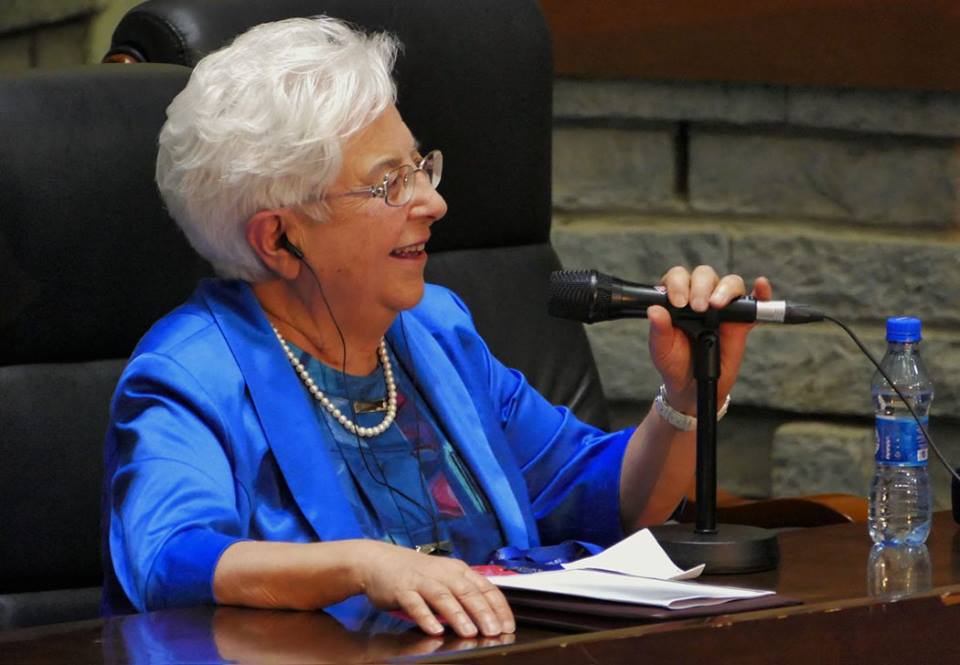
Mag 29, 2016 | Centro internazionale, Cultura, Focolare Worldwide, Focolari nel Mondo, Spiritualità
 Dare alla Legge un volto umano e di ricerca di una giustizia basata sul valore della fraternità, sono il forte messaggio che Maria Voce, avvocato e presidente del Movimento dei Focolari, ha dato ad un pubblico di 300 persone riunite lo scorso 25 maggio alla Facoltà di Giurisprudenza della Catholic University of Eastern Africa (CUEA), a Nairobi (Kenya). Erano studenti di diritto e scienze sociali, professori, membri della Facoltà, staff dell’università. Nel suo discorso dal titolo “Il Diritto nella società contemporanea”, Maria Voce spiega come con l’evoluzione della società, la correttezza dei comportamenti è stata sistematizzata nella comunità, e col raggiungimento dell’identità politica di uno Stato è stata incorporata nelle Costituzioni, nei suoi codici o in altre leggi. Con l’avvento del Cristianesimo, secondo la presidente dei Focolari, «emerge, come valore di riferimento, una legge superiore che viene da Dio, il solo Giusto e che è comunicata all’umanità in Gesù: la legge dell’amore».
Dare alla Legge un volto umano e di ricerca di una giustizia basata sul valore della fraternità, sono il forte messaggio che Maria Voce, avvocato e presidente del Movimento dei Focolari, ha dato ad un pubblico di 300 persone riunite lo scorso 25 maggio alla Facoltà di Giurisprudenza della Catholic University of Eastern Africa (CUEA), a Nairobi (Kenya). Erano studenti di diritto e scienze sociali, professori, membri della Facoltà, staff dell’università. Nel suo discorso dal titolo “Il Diritto nella società contemporanea”, Maria Voce spiega come con l’evoluzione della società, la correttezza dei comportamenti è stata sistematizzata nella comunità, e col raggiungimento dell’identità politica di uno Stato è stata incorporata nelle Costituzioni, nei suoi codici o in altre leggi. Con l’avvento del Cristianesimo, secondo la presidente dei Focolari, «emerge, come valore di riferimento, una legge superiore che viene da Dio, il solo Giusto e che è comunicata all’umanità in Gesù: la legge dell’amore».
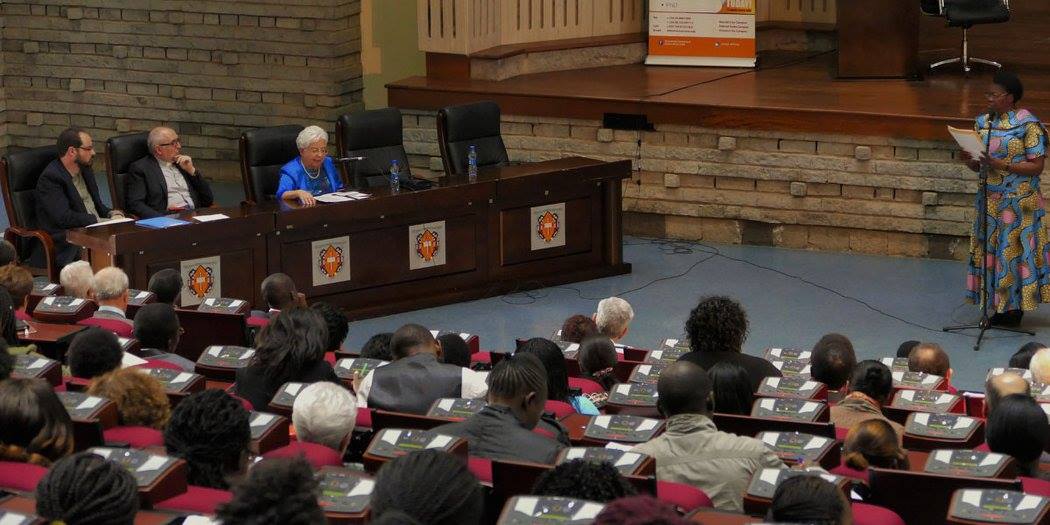
© CSC Audiovisivi – Verônica Farias

© CSC Audiovisivi – Verônica Farias
Willy Niyansaba
Testo dell’intervento di Maria Voce: “Il diritto nella società contemporanea”
(altro…)
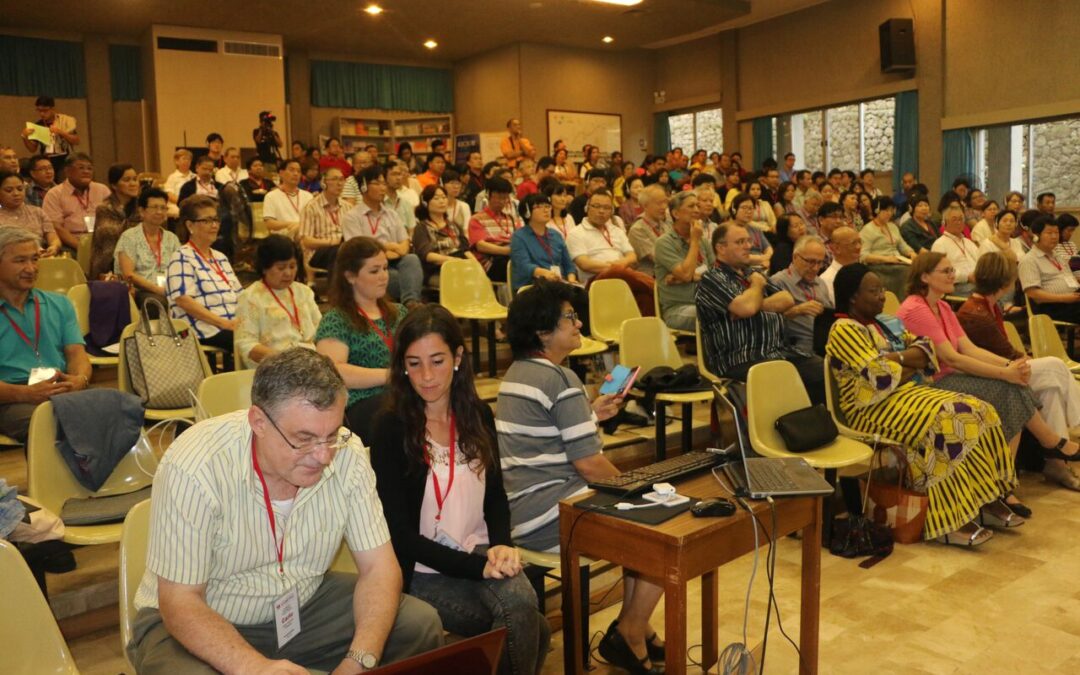
Mag 28, 2016 | Chiara Lubich, Cultura, Focolare Worldwide, Focolari nel Mondo
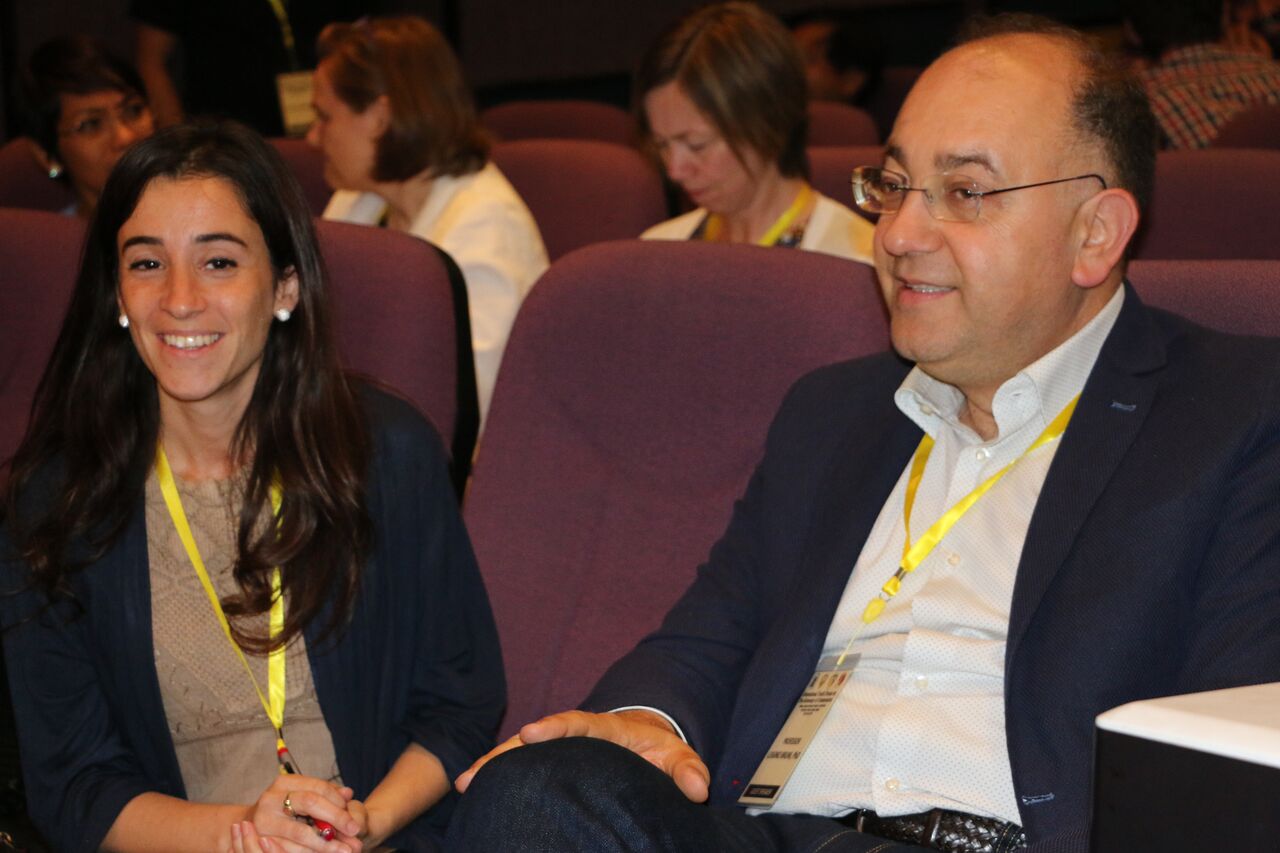 È il 29 maggio 1991 quando Chiara Lubich lancia a San Paolo, Brasile, l’Economia di comunione (EdC). Costatando le disuguaglianze sociali del paese, ella fa nascere una realtà che ben presto coinvolge imprenditori e lavoratori, studenti, professori e ricercatori, ricchi e poveri. Per Luigino Bruni, attuale coordinatore del progetto, i poveri rimangono tutt’oggi al centro dell’EdC: «Impossibile dimenticare le tante volte in cui Chiara Lubich, quando lavoravamo insieme, mi ripeteva: “Non dimenticare mai che l’Economia di comunione l’ho fatta nascere per i poveri”. Oggi abbiamo il dovere etico e spirituale di ricollocare la povertà e gli esclusi al centro del sistema economico, politico e sociale». I poveri sono i primi testimoni dell’esperienza nascente dei Focolari a Trento, quando, in piena guerra, Chiara e le sue prime compagne – esse stesse senza risorse – invitavano alla propria tavola i poveri e mettevano in comune quanto ricevevano.
È il 29 maggio 1991 quando Chiara Lubich lancia a San Paolo, Brasile, l’Economia di comunione (EdC). Costatando le disuguaglianze sociali del paese, ella fa nascere una realtà che ben presto coinvolge imprenditori e lavoratori, studenti, professori e ricercatori, ricchi e poveri. Per Luigino Bruni, attuale coordinatore del progetto, i poveri rimangono tutt’oggi al centro dell’EdC: «Impossibile dimenticare le tante volte in cui Chiara Lubich, quando lavoravamo insieme, mi ripeteva: “Non dimenticare mai che l’Economia di comunione l’ho fatta nascere per i poveri”. Oggi abbiamo il dovere etico e spirituale di ricollocare la povertà e gli esclusi al centro del sistema economico, politico e sociale». I poveri sono i primi testimoni dell’esperienza nascente dei Focolari a Trento, quando, in piena guerra, Chiara e le sue prime compagne – esse stesse senza risorse – invitavano alla propria tavola i poveri e mettevano in comune quanto ricevevano. 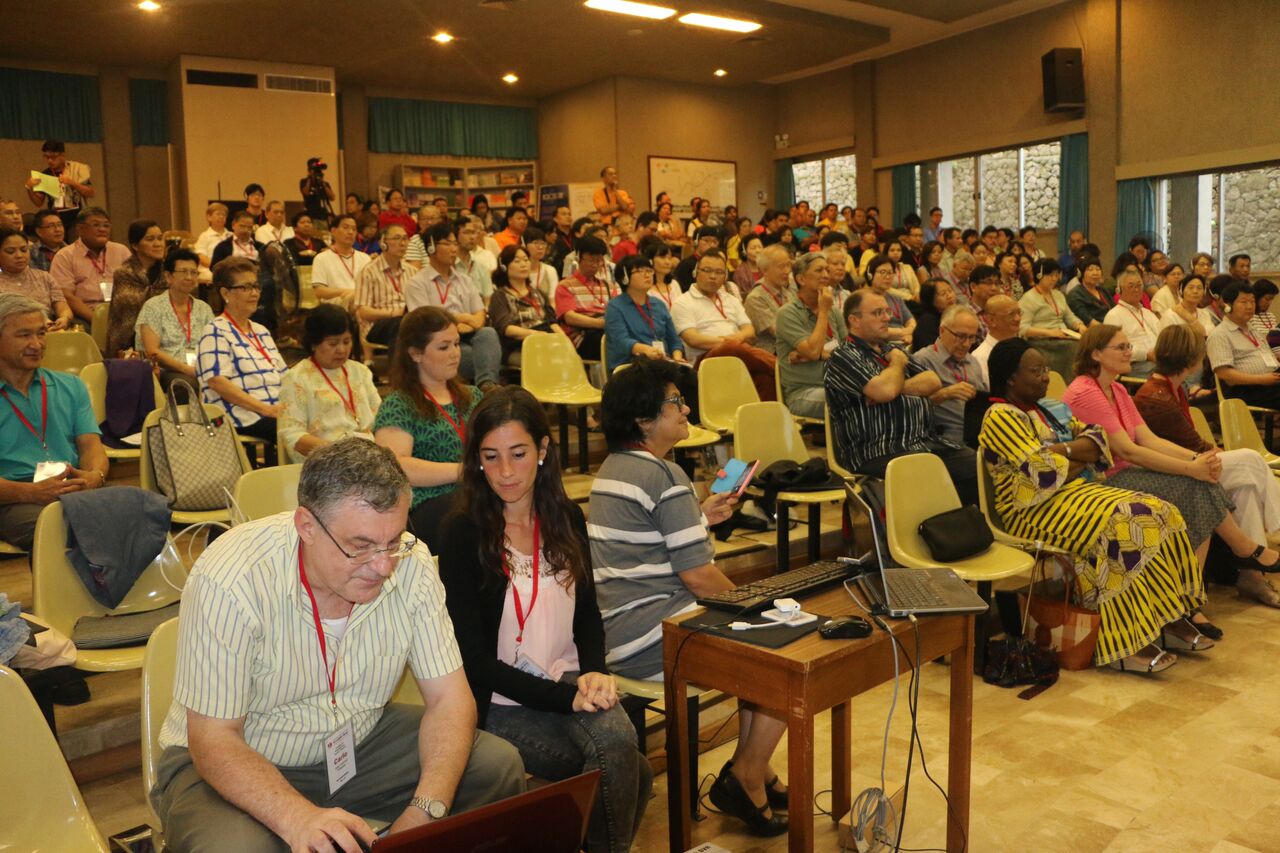 Quella stessa comunione, spirituale e materiale, caratterizza anche oggi gli attori dell’EdC, la sua principale risorsa: una comunità di persone, accomunate da una visione del mondo e dell’economia, che fa sua la lotta per la riduzione delle povertà e delle diseguaglianze. L’intreccio tra comunità e aziende ha nell’imprenditore di comunione la figura di riferimento. I 25 anni dell’EdC trovano espressione in un appuntamento internazionale nelle Filippine, a Tagaytay City (Manila), dal titolo “Economia di comunione, un’economia per tutti”. Dal 25 al 29 maggio, 250 partecipanti fanno il punto sul cammino percorso e dibattono sulle principali linee di azione a livello mondiale per i prossimi anni: Formare una rete internazionale di incubatori di aziende, con spazi e risorse nei Poli imprenditoriali nati dall’EdC, disponibili a sostenere soprattutto progetti di giovani imprenditori. Costituire un Osservatorio sulla Povertà, per assicurare che affrontare la povertà sia sempre centrale e conforme allo spirito dell’EdC, e per contribuire a identificare le sue periferie. Moltiplicare le Lab-Schools, laboratori di formazione in campo tecnico, professionale e imprenditoriale indirizzati in particolare ai giovani. La scelta dell’Asia per questo appuntamento mondiale non è casuale. «Qui vi si trovano tratti dello stesso panorama incontrato da Chiara in Brasile nel 1991. Ma vi sono anche ricchezza, giovani, imprenditorialità. È evidente il legame tra creazione di ricchezza e povertà. L’Economia di comunione vive finché tiene insieme ambedue» osserva Luigino Bruni. «Tra quindici anni la quota del PIL dell’Asia sarà doppia rispetto a quella di Stati Uniti ed Europa Occidentale. Il futuro del mondo quindi dipenderà molto dal tipo di economia che si svilupperà in Asia. Celebrare qui il 25º dell’Economia di comunione significa riconoscere che il futuro di essa nel continente asiatico è una questione cruciale». In contemporanea con il Convegno nelle Filippine, se ne stanno svolgendo altri in varie parti del mondo. Sabato 28 maggio, alle 21:00, ora di Manila, un collegamento internet permetterà di interagire con la Bolivia (Scuola Interamericana di imprenditori), Italia (Polo Lionello Bonfanti, Loppiano), Messico (Convegno di imprenditori a Puebla), Slovacchia (Convegno di imprenditori di Slovacchia e Cechia). Parteciperanno alla diretta, anche gruppi dell’EdC in Brasile, Costa D’Avorio, Guatemala, Madagascar, Panama, Portogallo, Russia, Spagna, Uganda. Una vera festa, nelle parole di Luigino Bruni: «In un mondo in cui manca la capacità di fare festa, l’Economia di comunione sembra il miracolo del pane che si moltiplica per i poveri, ma anche il miracolo del vino nelle nozze che arriva per i poveri e per tutti, il miracolo della festa della fraternità». Comunicato stampa Servizio Informazione Focolari, 27 maggio 2016 – Un’economia per tutti, poveri e ricchi
Quella stessa comunione, spirituale e materiale, caratterizza anche oggi gli attori dell’EdC, la sua principale risorsa: una comunità di persone, accomunate da una visione del mondo e dell’economia, che fa sua la lotta per la riduzione delle povertà e delle diseguaglianze. L’intreccio tra comunità e aziende ha nell’imprenditore di comunione la figura di riferimento. I 25 anni dell’EdC trovano espressione in un appuntamento internazionale nelle Filippine, a Tagaytay City (Manila), dal titolo “Economia di comunione, un’economia per tutti”. Dal 25 al 29 maggio, 250 partecipanti fanno il punto sul cammino percorso e dibattono sulle principali linee di azione a livello mondiale per i prossimi anni: Formare una rete internazionale di incubatori di aziende, con spazi e risorse nei Poli imprenditoriali nati dall’EdC, disponibili a sostenere soprattutto progetti di giovani imprenditori. Costituire un Osservatorio sulla Povertà, per assicurare che affrontare la povertà sia sempre centrale e conforme allo spirito dell’EdC, e per contribuire a identificare le sue periferie. Moltiplicare le Lab-Schools, laboratori di formazione in campo tecnico, professionale e imprenditoriale indirizzati in particolare ai giovani. La scelta dell’Asia per questo appuntamento mondiale non è casuale. «Qui vi si trovano tratti dello stesso panorama incontrato da Chiara in Brasile nel 1991. Ma vi sono anche ricchezza, giovani, imprenditorialità. È evidente il legame tra creazione di ricchezza e povertà. L’Economia di comunione vive finché tiene insieme ambedue» osserva Luigino Bruni. «Tra quindici anni la quota del PIL dell’Asia sarà doppia rispetto a quella di Stati Uniti ed Europa Occidentale. Il futuro del mondo quindi dipenderà molto dal tipo di economia che si svilupperà in Asia. Celebrare qui il 25º dell’Economia di comunione significa riconoscere che il futuro di essa nel continente asiatico è una questione cruciale». In contemporanea con il Convegno nelle Filippine, se ne stanno svolgendo altri in varie parti del mondo. Sabato 28 maggio, alle 21:00, ora di Manila, un collegamento internet permetterà di interagire con la Bolivia (Scuola Interamericana di imprenditori), Italia (Polo Lionello Bonfanti, Loppiano), Messico (Convegno di imprenditori a Puebla), Slovacchia (Convegno di imprenditori di Slovacchia e Cechia). Parteciperanno alla diretta, anche gruppi dell’EdC in Brasile, Costa D’Avorio, Guatemala, Madagascar, Panama, Portogallo, Russia, Spagna, Uganda. Una vera festa, nelle parole di Luigino Bruni: «In un mondo in cui manca la capacità di fare festa, l’Economia di comunione sembra il miracolo del pane che si moltiplica per i poveri, ma anche il miracolo del vino nelle nozze che arriva per i poveri e per tutti, il miracolo della festa della fraternità». Comunicato stampa Servizio Informazione Focolari, 27 maggio 2016 – Un’economia per tutti, poveri e ricchi
https://www.youtube.com/playlist?list=PLseXirhCvXpHfSeiIcXBqicR4Hfl4dxuB (altro…)
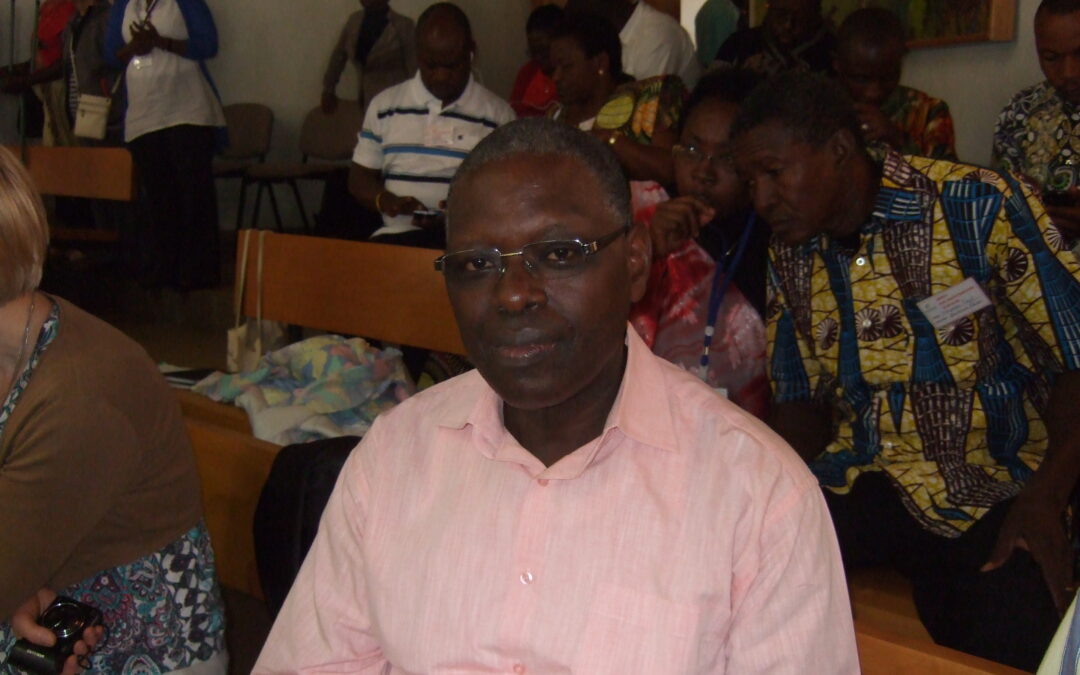
Mag 27, 2016 | Cultura, Focolare Worldwide, Focolari nel Mondo, Spiritualità
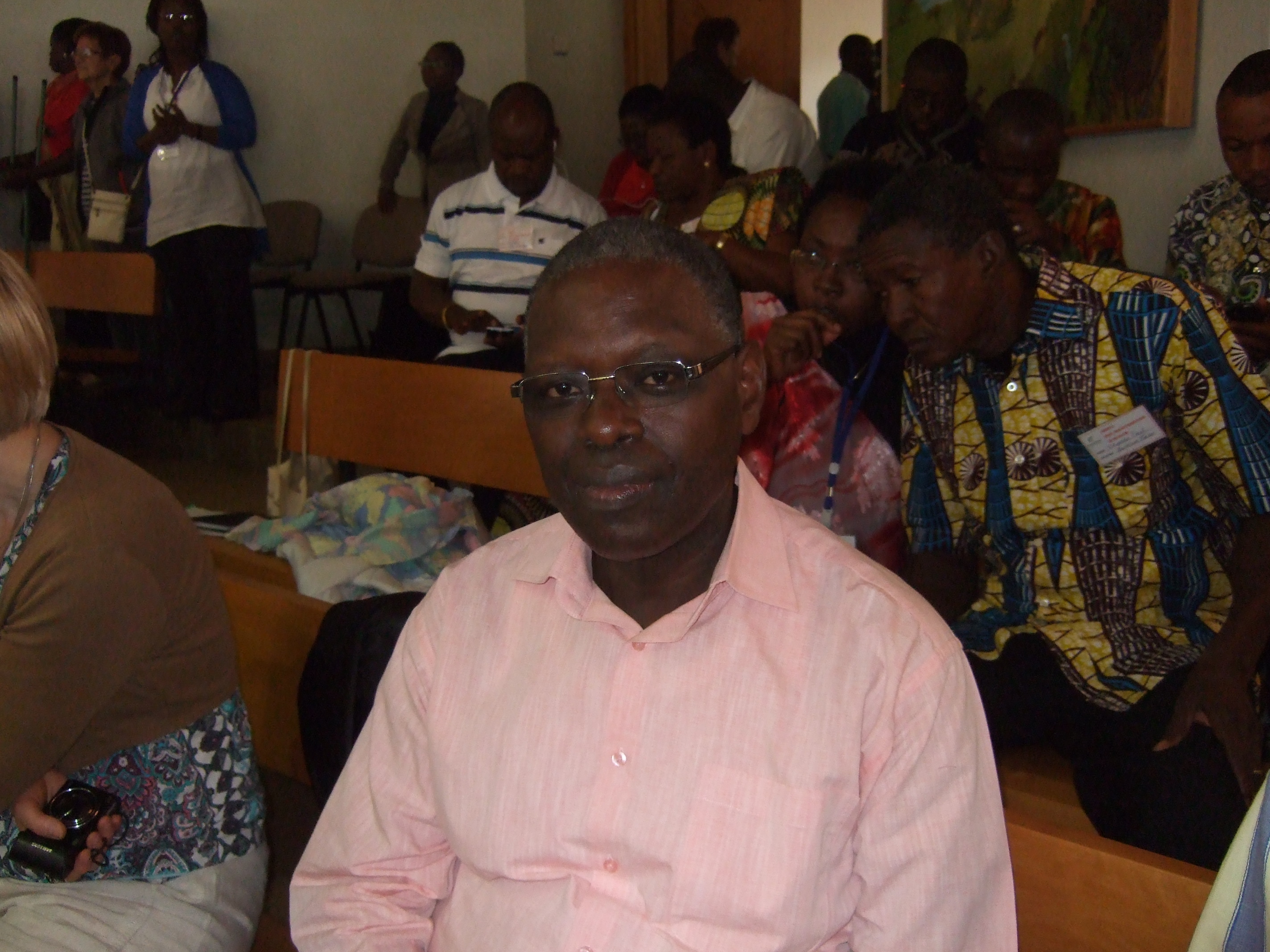 Durante la Scuola per l’Inculturazione sono emerse alcune preoccupazioni per quegli aspetti della modernità che possono mettere in ombra i valori fondamentali delle culture africane. Eppure lo sviluppo non si può fermare. Quale, secondo lei, la via per salvare i valori contenuti nelle tradizioni? «Penso, effettivamente, che lo sviluppo non possa essere impedito. Anche la cultura della tradizione nelle culture africane è sempre in evoluzione. La modernità, però, fa penetrare nelle tradizioni africane il materialismo, l’individualismo, il primato del denaro ed il capitalismo. Non dico che i soldi siano un male, ma l’utilizzo sbagliato ci fa dimenticare la nostra umanità, ciò che in Africa chiamiamo “ubuntu”. Ma la modernità contiene anche degli aspetti positivi: come la democrazia, i diritti dell’uomo, il pluralismo che ci fa accogliere l’altro, le differenze. In alcuni paesi africani ci si ammazza perché manca il pluralismo; esiste un “io collettivo” che è molto pericoloso. In questo senso l’individualismo – un valore dell’Occidente – non sembra del tutto negativo, perché se voglio scappare dall’“io collettivo”, ci vuole una buona dose di individualismo. Insomma, penso che ci voglia un equilibrio tra individualismo e pluralismo. È importante prenderne coscienza e rifletterci, anche se non è sufficiente. Penso che dobbiamo illuminare la cultura africana contaminata dai valori negativi della modernità. Credo che a questo punto deve intervenire il cristianesimo, che fa vedere l’altro come la mia strada verso la santificazione. Il Vangelo ci invita a mettere i soldi in secondo piano. Gesù mette al primo posto l’uomo, il prossimo. Per me questo è importante, mi sembra la via per salvare i valori universali contenuti nelle tradizioni». Quale impressione si porta via di questi giorni? Quali sfide da affrontare nella vita quotidiana dei popoli africani? «Attraverso una semplice situazione che mi è capitata, ho sentito che in questi giorni potevo rinascere, come Nicodemo. È stato il mio inizio della Scuola per l’Inculturazione. La seconda impressione forte è stata vedere le persone che sono qui. Scoprire che l’Africa è plurale, che c’è “la pluralità delle Afriche”. Avevo voglia di conoscere ciascuno, di capire come vive; parlare con un camerunese, che è molto diverso da un burundese, un ruandese o un etiope. Qui ho sperimentato la pluralità dell’Africa. Ma, come africani, ci incontriamo in certi valori comuni: la solidarietà, la famiglia e le relazioni familiari, la comunione, la centralità dell’educazione dei nostri figli; questo è importante per noi africani, anche se siamo molto diversi. Per me, la sfida per sconfiggere le guerre interne, passa dall’incarnare nel quotidiano, nella vita socio politica, le parole del Vangelo. È la sfida che parte da questi giorni: tornati a casa, come ci comporteremo verso quelli che sono diversi da noi? Come ci comporteremo verso i nostri nemici? Verso le persone che non sono del mio partito politico, che non mi apprezzano? Sarò capace di amarli? Sarò questa “luce bianca” del Vangelo, nelle realtà sociali, politiche, nelle incomprensioni tra i vari gruppi della stessa nazione? Questo impegno mi porto via: la sfida di questo tempo per sconfiggere i grandi problemi dell’Africa». A cura di Irena Sargankova (altro…)
Durante la Scuola per l’Inculturazione sono emerse alcune preoccupazioni per quegli aspetti della modernità che possono mettere in ombra i valori fondamentali delle culture africane. Eppure lo sviluppo non si può fermare. Quale, secondo lei, la via per salvare i valori contenuti nelle tradizioni? «Penso, effettivamente, che lo sviluppo non possa essere impedito. Anche la cultura della tradizione nelle culture africane è sempre in evoluzione. La modernità, però, fa penetrare nelle tradizioni africane il materialismo, l’individualismo, il primato del denaro ed il capitalismo. Non dico che i soldi siano un male, ma l’utilizzo sbagliato ci fa dimenticare la nostra umanità, ciò che in Africa chiamiamo “ubuntu”. Ma la modernità contiene anche degli aspetti positivi: come la democrazia, i diritti dell’uomo, il pluralismo che ci fa accogliere l’altro, le differenze. In alcuni paesi africani ci si ammazza perché manca il pluralismo; esiste un “io collettivo” che è molto pericoloso. In questo senso l’individualismo – un valore dell’Occidente – non sembra del tutto negativo, perché se voglio scappare dall’“io collettivo”, ci vuole una buona dose di individualismo. Insomma, penso che ci voglia un equilibrio tra individualismo e pluralismo. È importante prenderne coscienza e rifletterci, anche se non è sufficiente. Penso che dobbiamo illuminare la cultura africana contaminata dai valori negativi della modernità. Credo che a questo punto deve intervenire il cristianesimo, che fa vedere l’altro come la mia strada verso la santificazione. Il Vangelo ci invita a mettere i soldi in secondo piano. Gesù mette al primo posto l’uomo, il prossimo. Per me questo è importante, mi sembra la via per salvare i valori universali contenuti nelle tradizioni». Quale impressione si porta via di questi giorni? Quali sfide da affrontare nella vita quotidiana dei popoli africani? «Attraverso una semplice situazione che mi è capitata, ho sentito che in questi giorni potevo rinascere, come Nicodemo. È stato il mio inizio della Scuola per l’Inculturazione. La seconda impressione forte è stata vedere le persone che sono qui. Scoprire che l’Africa è plurale, che c’è “la pluralità delle Afriche”. Avevo voglia di conoscere ciascuno, di capire come vive; parlare con un camerunese, che è molto diverso da un burundese, un ruandese o un etiope. Qui ho sperimentato la pluralità dell’Africa. Ma, come africani, ci incontriamo in certi valori comuni: la solidarietà, la famiglia e le relazioni familiari, la comunione, la centralità dell’educazione dei nostri figli; questo è importante per noi africani, anche se siamo molto diversi. Per me, la sfida per sconfiggere le guerre interne, passa dall’incarnare nel quotidiano, nella vita socio politica, le parole del Vangelo. È la sfida che parte da questi giorni: tornati a casa, come ci comporteremo verso quelli che sono diversi da noi? Come ci comporteremo verso i nostri nemici? Verso le persone che non sono del mio partito politico, che non mi apprezzano? Sarò capace di amarli? Sarò questa “luce bianca” del Vangelo, nelle realtà sociali, politiche, nelle incomprensioni tra i vari gruppi della stessa nazione? Questo impegno mi porto via: la sfida di questo tempo per sconfiggere i grandi problemi dell’Africa». A cura di Irena Sargankova (altro…)

Mag 26, 2016 | Cultura, Focolare Worldwide, Focolari nel Mondo
 May 25- The Pan-Asian Congress 2016 with its theme Economy of Communion, An Economy For All, just started in Mariapolis Peace, in Tagaytay City before the scenic Taal lake and volcano. It was also fitting that in this week the National Weather Bureau just announced that it will be the start of the rainy season ending a long dry spell that made many farmers suffer in the Philippines. The Philippines is also entering a new phase as it just elected its new government leaders.
May 25- The Pan-Asian Congress 2016 with its theme Economy of Communion, An Economy For All, just started in Mariapolis Peace, in Tagaytay City before the scenic Taal lake and volcano. It was also fitting that in this week the National Weather Bureau just announced that it will be the start of the rainy season ending a long dry spell that made many farmers suffer in the Philippines. The Philippines is also entering a new phase as it just elected its new government leaders.

Teresa and Francis Ganzon
and
Francis Ganzon, of the EoC Asian commission welcomed the 300 participants coming from different parts of Asia. There was a large delegation from Korea. The co-directors of Mariapolis Peace,
Giuseppe Arsi and
Cecilia Caro gave the welcome remarks, wishing that this event which celebrates the 25th Anniversary of EoC, would be a milestone not only for Asia but for the whole world. To better introduce EoC, a
video presented in the United Nations was shown. The video emphasized the goal of helping the poor in all of EoC’s 750 businesses worldwide so that there will be no one who will be in need.

Luigino Bruni
After the video,
Luigino Bruni, from the EoC International Commission, gave a beautiful reflection about the theme of
25 years of EoC. He first presented a graph of the world’s GDP in the last 200 years. The graph shows that
before the industrial revolution, the Asian GDP was greater than that of the West. For almost 200 years the West’s GDP was ahead of Asia.
It was only in 2010 that Asia has taken again the lead over the West. He pointed out that future of the world very much depends on the economies which are developing in Asia. Then, he outlined and explained what EoC has become in the last 25 years.
He explained why we are celebrating EoC’s 25th year in Asia and in the Philippines. It is because of thefriendship and communion with friends here. He recalled that the EoC international Commission, have started to reflect systemically on poverty, when he and a Dutch banker,
Leo Andringa, an EoC advocate (who recently just passed away) visited the Philippines in 2005. They saw poverty in a special light and in a different way. With this they have thought of establishing an
EoC International Observatory on Poverty for poverty is at the heart of EoC. He recalled that once
Chiara Lubich, EoC’s founder commented that the poor should be EoC’s focus for as long as we have not yet meet their needs, we have not succeeded yet in our goal that “
all may be one“. Bruni
emphasized the principle of subsidiarity and that the only concrete reality in the world is the real person and he/she should be the center of any intervention or help. He pointed out that
the poor have also their competencies. They have some wealth in them. In this regard, we should esteem the dignity of the human person. He added, with poor people, there is such
resilience even if they live in difficult homes and working conditions.

Bruni made a thought-provoking reflection on
the intelligence of the trees compared to the intelligence of animals to show this resilience. After the moving talk of Bruni, which was warmly appreciated by almost everyone,
Tina Bonifacio of the EoC commission, led the participants in getting to know each other by grouping them according to their sectors:
academe,
entrepreneurs,
professionals,
non-government or government organizations and
young people. To end the day in a light mode, a lively, artistic and cultural program was prepared by the citizens of the Mariapolis Peace, especially by its youths who presented colorful dances and lively songs, adding to the friendship and communion among everyone. See
EoC Asia website https://vimeo.com/168195062
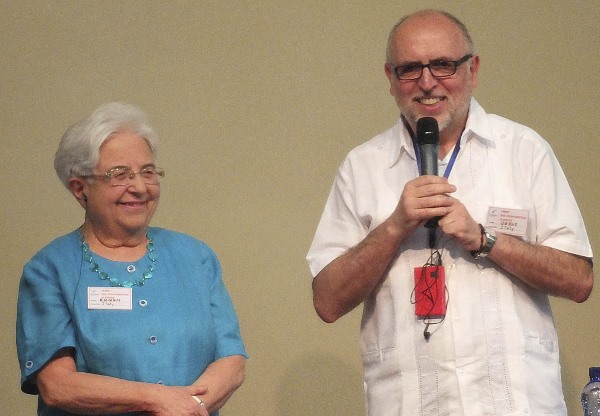
Mag 25, 2016 | Centro internazionale, Cultura, Focolare Worldwide, Focolari nel Mondo, Spiritualità
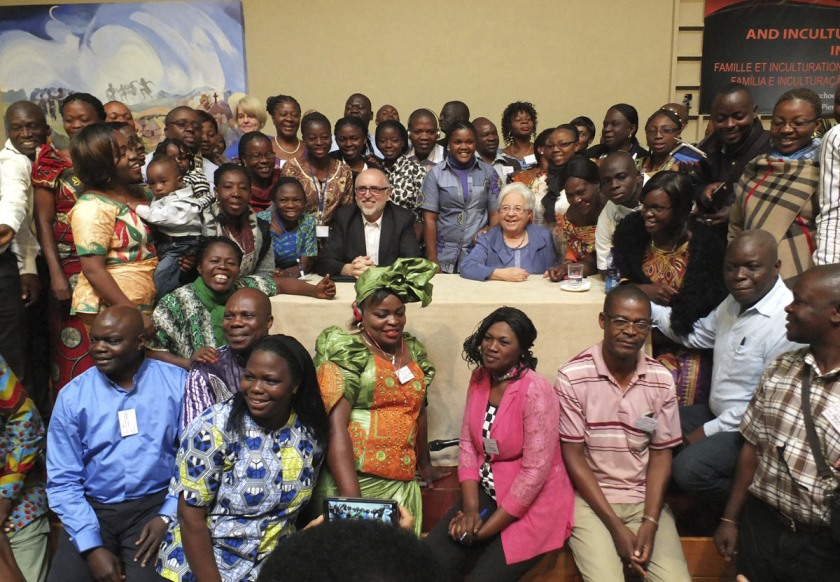 Che cosa è l’inculturazione oggi? «È l’incarnazione della luce del Vangelo nelle culture africane», dichiara Maria Voce rivolgendosi ai 305 partecipanti alla Scuola per l’inculturazione tenutasi la scorsa settimana alla cittadella dei Focolari “Mariapoli Piero” che sorge nei pressi di Nairobi (Kenya). La gioia, la sorpresa, l’entusiasmo sono gli stessi di quando, nel 1992, Chiara Lubich aveva posto la prima pietra della Mariapoli e, quindi, anche della scuola di inculturazione che vi sarebbe sorta. La fondatrice dei Focolari aveva infatti immaginato nella cittadella una scuola per un dialogo a tutto campo tra il Vangelo e le culture africane, una scuola che avrebbe dato un nuovo impulso all’evangelizzazione. E il copresidente Jesús Morán precisa: «Farsi uno è il modo più profondo di inculturazione. Si tratta di un’esperienza che Chiara fece qui in Africa e che poi propose come metodo anche a tutti noi nel mondo. Il “farsi uno” prende a modello Gesù nel suo abbandono in croce, quando cioè per amore dell’umanità Egli ha voluto farsi nulla, un nulla d’amore. Anche noi come Lui, di fronte alle diverse culture dobbiamo imparare a farci nulla, per poi sperimentare che non si tratta di un nulla che annulla, ma di un nulla che arricchisce». Per molti partecipanti questa affermazione contiene la risposta alle tante sfide del continente africano, compresa quella dell’inculturazione. Ma anche una risposta al fenomeno della globalizzazione.
Che cosa è l’inculturazione oggi? «È l’incarnazione della luce del Vangelo nelle culture africane», dichiara Maria Voce rivolgendosi ai 305 partecipanti alla Scuola per l’inculturazione tenutasi la scorsa settimana alla cittadella dei Focolari “Mariapoli Piero” che sorge nei pressi di Nairobi (Kenya). La gioia, la sorpresa, l’entusiasmo sono gli stessi di quando, nel 1992, Chiara Lubich aveva posto la prima pietra della Mariapoli e, quindi, anche della scuola di inculturazione che vi sarebbe sorta. La fondatrice dei Focolari aveva infatti immaginato nella cittadella una scuola per un dialogo a tutto campo tra il Vangelo e le culture africane, una scuola che avrebbe dato un nuovo impulso all’evangelizzazione. E il copresidente Jesús Morán precisa: «Farsi uno è il modo più profondo di inculturazione. Si tratta di un’esperienza che Chiara fece qui in Africa e che poi propose come metodo anche a tutti noi nel mondo. Il “farsi uno” prende a modello Gesù nel suo abbandono in croce, quando cioè per amore dell’umanità Egli ha voluto farsi nulla, un nulla d’amore. Anche noi come Lui, di fronte alle diverse culture dobbiamo imparare a farci nulla, per poi sperimentare che non si tratta di un nulla che annulla, ma di un nulla che arricchisce». Per molti partecipanti questa affermazione contiene la risposta alle tante sfide del continente africano, compresa quella dell’inculturazione. Ma anche una risposta al fenomeno della globalizzazione.  «L’inculturazione è necessaria – rilancia Morán –. Col nostro vivere la spiritualità dell’unità possiamo avvicinare la cultura dell’altro nel rispetto della sua verità e scoprire, nel dialogo, la bellezza delle diversità, non solo in Africa ma in tutto il mondo». «Un mondo – sottolinea Maria Voce – che sta portando sulle spalle tante sofferenze per la mancanza di armonia e di pace. Col profondo “farsi uno” si favorisce l’inculturazione, la quale può rappresentare un possibile percorso di riconciliazione». A 24 anni dalla sua fondazione, «la scuola – rileva ancora Maria Voce – ha messo a punto quegli strumenti individuati fin dall’inizio, giungendo alla sua seconda generazione». E guardando al futuro aggiunge: «stiamo entrando in una nuova fase della scuola, che vedrà forse un suo ulteriore moltiplicarsi». Parole, queste della presidente, che risuonano come «una chiamata ad una nuova consapevolezza e responsabilità», come molti osservano, per proseguire sulla strada di quell’inculturazione che Chiara aveva intuito dopo essere stata, a partire dagli anni ’60, a contatto con i popoli africani. In particolare la presidente dei Focolari si sofferma sulla comprensione che nel ‘92 Chiara aveva avuto riguardo la luce del Vangelo, una “luce bianca” capace di penetrare ed illuminare le diverse culture facendole così diventare dono reciproco e dono per il mondo. «Maria Voce – dice Peter del Camerun – ha riorientato il nostro cuore alla nostra specifica vocazione che è incarnare la spiritualità dell’unità che non impone ma che, come diceva Chiara, è una “luce bianca” che illumina. La globalizzazione sta seguendo un processo inarrestabile nel quale il dono specifico nostro è la vita del Vangelo». «Tornando a casa – si chiede Nicodème del Burundi –, mi pare di capire che devo cominciare da me stesso, vivendo il Vangelo nella realtà sociale e politica, nei conflitti, per essere una risposta d’amore alle attese di molti paesi dell’Africa. Non si può aspettare». (altro…)
«L’inculturazione è necessaria – rilancia Morán –. Col nostro vivere la spiritualità dell’unità possiamo avvicinare la cultura dell’altro nel rispetto della sua verità e scoprire, nel dialogo, la bellezza delle diversità, non solo in Africa ma in tutto il mondo». «Un mondo – sottolinea Maria Voce – che sta portando sulle spalle tante sofferenze per la mancanza di armonia e di pace. Col profondo “farsi uno” si favorisce l’inculturazione, la quale può rappresentare un possibile percorso di riconciliazione». A 24 anni dalla sua fondazione, «la scuola – rileva ancora Maria Voce – ha messo a punto quegli strumenti individuati fin dall’inizio, giungendo alla sua seconda generazione». E guardando al futuro aggiunge: «stiamo entrando in una nuova fase della scuola, che vedrà forse un suo ulteriore moltiplicarsi». Parole, queste della presidente, che risuonano come «una chiamata ad una nuova consapevolezza e responsabilità», come molti osservano, per proseguire sulla strada di quell’inculturazione che Chiara aveva intuito dopo essere stata, a partire dagli anni ’60, a contatto con i popoli africani. In particolare la presidente dei Focolari si sofferma sulla comprensione che nel ‘92 Chiara aveva avuto riguardo la luce del Vangelo, una “luce bianca” capace di penetrare ed illuminare le diverse culture facendole così diventare dono reciproco e dono per il mondo. «Maria Voce – dice Peter del Camerun – ha riorientato il nostro cuore alla nostra specifica vocazione che è incarnare la spiritualità dell’unità che non impone ma che, come diceva Chiara, è una “luce bianca” che illumina. La globalizzazione sta seguendo un processo inarrestabile nel quale il dono specifico nostro è la vita del Vangelo». «Tornando a casa – si chiede Nicodème del Burundi –, mi pare di capire che devo cominciare da me stesso, vivendo il Vangelo nella realtà sociale e politica, nei conflitti, per essere una risposta d’amore alle attese di molti paesi dell’Africa. Non si può aspettare». (altro…)
![[:de]So sollen auch sie eins sein[:]](https://www.focolare.org/wp-content/uploads/2016/05/Chiara-Lubich.jpg)
 “Alle sollen eins sein…” Diese Bitte Jesu wird als sein Vermächtnis bezeichnet: Einheit ist das Herzensanliegen Gottes. Es geht um eine Einheit, die lebendige Beziehung ist, Vielfalt und Fülle, göttliches Geschenk und Auftrag zugleich. In den Impulsgedanken von Chiara Lubich (1920-2008) spiegeln sich facettenreiche Erfahrungen; sie sind gekennzeichnet von mystischer Tiefe und enthalten vielfältige Anstöße zu einem neuen Miteinander. UTOREN: „Chiara Lubich gehört zu den wenigen ganz großen spirituellen Stimmen unserer Zeit“ (Kardinal Karl Lehmann). Verlag Neue Stadt[:]
“Alle sollen eins sein…” Diese Bitte Jesu wird als sein Vermächtnis bezeichnet: Einheit ist das Herzensanliegen Gottes. Es geht um eine Einheit, die lebendige Beziehung ist, Vielfalt und Fülle, göttliches Geschenk und Auftrag zugleich. In den Impulsgedanken von Chiara Lubich (1920-2008) spiegeln sich facettenreiche Erfahrungen; sie sind gekennzeichnet von mystischer Tiefe und enthalten vielfältige Anstöße zu einem neuen Miteinander. UTOREN: „Chiara Lubich gehört zu den wenigen ganz großen spirituellen Stimmen unserer Zeit“ (Kardinal Karl Lehmann). Verlag Neue Stadt[:]

 Dare alla Legge un volto umano e di ricerca di una giustizia basata sul valore della fraternità, sono il forte messaggio che
Dare alla Legge un volto umano e di ricerca di una giustizia basata sul valore della fraternità, sono il forte messaggio che 






 May 25- The Pan-Asian Congress 2016 with its theme Economy of Communion, An Economy For All, just started in Mariapolis Peace, in Tagaytay City before the scenic Taal lake and volcano. It was also fitting that in this week the National Weather Bureau just announced that it will be the start of the rainy season ending a long dry spell that made many farmers suffer in the Philippines. The Philippines is also entering a new phase as it just elected its new government leaders.
May 25- The Pan-Asian Congress 2016 with its theme Economy of Communion, An Economy For All, just started in Mariapolis Peace, in Tagaytay City before the scenic Taal lake and volcano. It was also fitting that in this week the National Weather Bureau just announced that it will be the start of the rainy season ending a long dry spell that made many farmers suffer in the Philippines. The Philippines is also entering a new phase as it just elected its new government leaders. 

 Bruni made a thought-provoking reflection on the intelligence of the trees compared to the intelligence of animals to show this resilience. After the moving talk of Bruni, which was warmly appreciated by almost everyone,
Bruni made a thought-provoking reflection on the intelligence of the trees compared to the intelligence of animals to show this resilience. After the moving talk of Bruni, which was warmly appreciated by almost everyone, 
